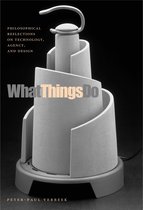Nihilism and Technology
Afbeeldingen
Sla de afbeeldingen overArtikel vergelijken
Auteur:
Nolen Gertz
- Engels
- Paperback
- 9781786607034
- 17 juni 2018
- 242 pagina's
Samenvatting
This book brings together the philosophies of technology and nihilism to investigate how we use technologies, from Netflix and Fitbit to Twitter and Google. It diagnoses how technologies are nihilistic and how our nihilism has become technological.
Heidegger, Marcuse, and Ellul warned against the rise of a technological mass culture. Philosophy of technology has since turned away from such dystopic views, promoting instead the view that we shape technologies just as technologies shape us. Yet the rise of Big Data has exceeded our worst fears about Big Brother, leading us to again question whether technologies are empowering us or enslaving us. Rather than engage in endless debates about whether technologies are making us better or making us worse, Nolen Gertz investigates what we think “better” and “worse” mean, and what role this thinking has played in the creation of our technological world. This investigation is carried out by using Nietzsche’s philosophy of nihilism in order to explore the ways in which our values mediate how we design technologies and how we use technologies. Examining our technological practices—practices ranging from Netflix and Chill to Fitbit and Move to Twitter and Rage—reveals how our nihilism and our technologies have become intertwined, creating a world of techno-hypnosis, data-driven activity, pleasure economics, herd networking, and orgies of clicking.
Heidegger, Marcuse, and Ellul warned against the rise of a technological mass culture. Philosophy of technology has since turned away from such dystopic views, promoting instead the view that we shape technologies just as technologies shape us. Yet the rise of Big Data has exceeded our worst fears about Big Brother, leading us to again question whether technologies are empowering us or enslaving us. Rather than engage in endless debates about whether technologies are making us better or making us worse, Nolen Gertz investigates what we think “better” and “worse” mean, and what role this thinking has played in the creation of our technological world. This investigation is carried out by using Nietzsche’s philosophy of nihilism in order to explore the ways in which our values mediate how we design technologies and how we use technologies. Examining our technological practices—practices ranging from Netflix and Chill to Fitbit and Move to Twitter and Rage—reveals how our nihilism and our technologies have become intertwined, creating a world of techno-hypnosis, data-driven activity, pleasure economics, herd networking, and orgies of clicking.
Productspecificaties
Wij vonden geen specificaties voor jouw zoekopdracht '{SEARCH}'.
Inhoud
- Taal
- en
- Bindwijze
- Paperback
- Oorspronkelijke releasedatum
- 17 juni 2018
- Aantal pagina's
- 242
- Illustraties
- Nee
Betrokkenen
- Hoofdauteur
- Nolen Gertz
- Hoofduitgeverij
- Rowman & Littlefield International
Overige kenmerken
- Extra groot lettertype
- Nee
- Product breedte
- 150 mm
- Product hoogte
- 15 mm
- Product lengte
- 228 mm
- Studieboek
- Ja
- Verpakking breedte
- 151 mm
- Verpakking hoogte
- 20 mm
- Verpakking lengte
- 232 mm
- Verpakkingsgewicht
- 379 g
EAN
- EAN
- 9781786607034
Je vindt dit artikel in
- Categorieën
- Taal
- Engels
- Boek, ebook of luisterboek?
- Boek
- Studieboek of algemeen
- Algemene boeken
- Beschikbaarheid
- Leverbaar
Kies gewenste uitvoering
Kies je bindwijze
(3)
Prijsinformatie en bestellen
De prijs van dit product is 32 euro en 99 cent.
Uiterlijk 17 mei in huis
Verkoop door bol
- Prijs inclusief verzendkosten, verstuurd door bol
- Ophalen bij een bol afhaalpunt mogelijk
- 30 dagen bedenktijd en gratis retourneren
- Dag en nacht klantenservice
Vaak samen gekocht
Rapporteer dit artikel
Je wilt melding doen van illegale inhoud over dit artikel:
- Ik wil melding doen als klant
- Ik wil melding doen als autoriteit of trusted flagger
- Ik wil melding doen als partner
- Ik wil melding doen als merkhouder
Geen klant, autoriteit, trusted flagger, merkhouder of partner? Gebruik dan onderstaande link om melding te doen.









